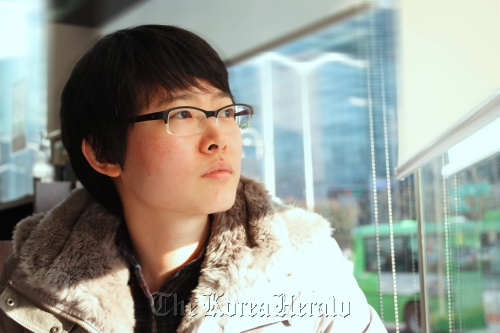KangYu’s award-winning personal documentary features generation gap, lives of ‘house poor’
This is the fourth article in a series on up-and-coming Korean filmmakers. ― Ed.
It took making a film for director Kang Yu Ga-ram to understand her father’s life.
The two did not share much in common to begin with. Her father is a firm supporter of the conservative Grand National Party; KangYu has worked with progressive NGOs and film production houses. He spent most of his life on construction sites; she obtained her master’s degree in women’s studies.
And her DMZ DOCS-winning documentary “My Father’s House” began with KangYu simply wanting to examine the generation gap between her father and herself. It was to be about her father and things that have influenced his political stance.
This is the fourth article in a series on up-and-coming Korean filmmakers. ― Ed.
It took making a film for director Kang Yu Ga-ram to understand her father’s life.
The two did not share much in common to begin with. Her father is a firm supporter of the conservative Grand National Party; KangYu has worked with progressive NGOs and film production houses. He spent most of his life on construction sites; she obtained her master’s degree in women’s studies.
And her DMZ DOCS-winning documentary “My Father’s House” began with KangYu simply wanting to examine the generation gap between her father and herself. It was to be about her father and things that have influenced his political stance.

“It really started off as a group project,” KangYu, who looks exactly the way she appears in the movie, tells The Korea Herald. “A group of people at the production house I work for wanted to feature our fathers and their (conservative) political stance together. And I just ended up focusing on my own, and something more.”
Her debut movie features the life of her father, who is eagerly waiting for his old apartment ― part of the famous Eunma Apartment Complex in Gangnam ― to be redeveloped so he can benefit from its higher price. But he refuses to sell the apartment, even though it is the only way to save the struggling business he started after his retirement. Throughout the movie, KangYu follows what’s behind her father’s strong, almost obsessive attachment to the apartment, while making her very first attempt to understand who he is as a person.
“(Until I worked on the film) each of my family members focused on their own job,” she says. “My father brought money home, my mother took care of me and my sister, and I worked hard at school. We didn’t talk to each other very often. On top of everything else, I did not get to live with my father until my middle school years. I was never really interested in his life or what his thoughts are.”
When her mother was pregnant with KangYu, her father left for a construction site in the Middle East, and returned to Korea when she was attending elementary school. Extremely education-oriented, her parents decided to live separately so KangYu and her sister could attend schools in Seoul.
“My mother lived with us in Seoul, while my father worked for construction sites of dams and bridges in the countryside,” KangYu says. “He would only come home on weekends. It continued that way until he finally moved in with us in Seoul when I was in middle school.”
Now in her early 30s, KangYu still remembers her first encounter with her father who had just returned from the Middle East. And the experience is reflected in the original Korean title of the movie, which translates as “Sand.”
“It felt as if he had brought the dry, crunchy sand from the Middle East,” she says. “I felt that dry, awkward feeling lasted for a long time in my family.”
A sense of guilt permeates the movie. Calling herself a “product of fanatically education-oriented Korean parents,” KangYu holds both bachelor’s and master’s degrees from one of the most prestigious women’s universities in the country, but still isn’t financially independent. She makes clear in the movie that financing her education has been deeply linked to her father’s obsession with the apartment.
“He witnessed the booming of Korea’s civil engineering and construction industry,” she says. “His personal success took place with the growth of the Korean economy. I think he empathizes with President Lee Myung-bak’s success story and stands by it.”
It was not an easy decision to share her personal story in the movie, but KangYu says she does not regret it.
“In the beginning I think I simply wanted to make a movie about my father’s political stance,” she says. “Yet while I was working on it, I couldn’t help but examine my life and myself. I meet a lot of audience members who tell me that they’ve had similar experiences while living in apartment complexes in Gangnam. And that gives this movie a meaning.”
By Claire Lee (dyc@heraldcorp.com)
-
Articles by Korea Herald




















![[Today’s K-pop] BTS pop-up event to come to Seoul](http://res.heraldm.com/phpwas/restmb_idxmake.php?idx=642&simg=/content/image/2024/04/17/20240417050734_0.jpg&u=)